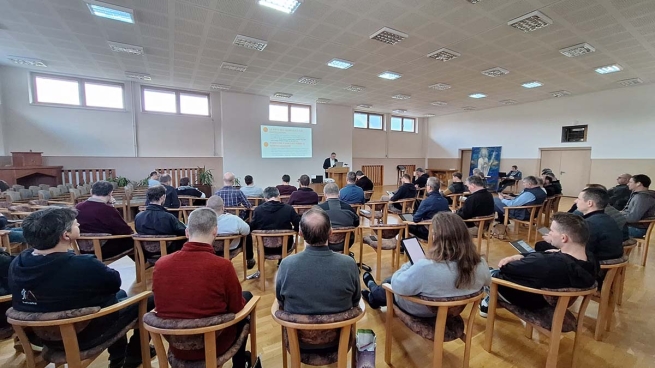During the training sessions, one key focus was enhancing communication between the Rector and the Oratory Director. Fr. García Morcuende emphasized the vital role of communication in interpersonal relationships, likening it to breathing for life itself. He underscored the innate human desire to express and connect with others. As relationships within Educational-Pastoral Communities (EPCs) become more intricate, there's a need to navigate between fostering healthy, enriching connections ("tonic" relationships) and minimizing detrimental ones ("toxic" relationships).
Furthermore, the General Councillor emphasized the importance of five essential actions for a Rector or Oratory Animator, drawing inspiration from the philosophy of Harvard Business School lecturer Hubert Joly. Joly proposes the concept of the five 'Be's' philosophy, which outlines five fundamental ways of being for effective leadership in today's context.
Finally, in addition to informal (unplanned) communication, the councillor also addressed four other structured scenarios within the EPC: the Local Council, the EPC Council, the SEPP -local Salesian Educational-Pastoral Project, and the general planning of the work.
The second theme focused on education in love, particularly on accompanying young people in the areas of affectivity and sexuality. Regarding this topic, Fr. García Morcuende emphasized Don Bosco's deliberate choice to directly involve himself in the lives and various dimensions of his boys—physical, emotional, mental, and spiritual. Many of these young individuals faced complex situations of abandonment and loneliness, which Don Bosco illuminated and guided. Attention to the affective dimension was a constant consideration within his Preventive System.
Today, Education in Affectivity presents an opportunity to listen to and address concerns, doubts, and inquiries within an integrated perspective. Affectivity and sexuality constitute essential components of well-being and are integral to individuals' relationships throughout their lives. Through group discussions and assemblies, participants shared knowledge, attitudes, and, most importantly, educational principles that foster the gradual development of skills necessary for educators to accompany young people flexibly and effectively across various life contexts.
Finally, the discussion turned to the topic of charismatic and Salesian identity in Europe. The General Councillor for Youth Ministry presented several proposals, including: prioritizing pastoral initiatives that are dynamic, essential, and forward-thinking; emphasizing personalized faith formation, integrating inner growth and meaningful experiences; and enhancing the sense of community, extending beyond physical boundaries.
"Our European reality presents an opportunity for the emergence of a new pastoral wisdom," he remarked. "Recognizing the connection between our past pastoral practices and today's cultural and social landscape enables us to grasp not only the necessary shifts occurring but also the groundwork for future transformations. In this stage of history, tangible actions, timely choices, and bold ventures matter most. The most effective pastoral endeavors are not those of the past or the future, but those we can envision and construct collectively today."


